Landing A new Job After a Career Break –…
transcript
Transcript
Landing A New Job After a Career Break
Here to read instead of watch? Click through the headings to a section of the full transcript, or scroll away!
- Sharing Why People Might Take a Career Break
- Embrace Moving Forward With Purpose
- A Career Break Doesn’t Define You
- Your Professional Story, Potential & Value Does Define You
- The Shift: Preparing &Equipping Yourself to Move Back Into Work
- The Statistics Around Career Breaks for Women
- Why Mindset Matters (with Case Study!)
- Homework #1: Self Assessment
- The Framework for Interviewing
- The Framework: Enthusiasm for Learning (with Case Study!)
- How Enthusiasm for Learning Could Be Articulated in an Interview
- Homework #2: Prioritise Gaps & Make a Learning Plan
- The Framework: Own Your Story (with Case Study!)
- How Owning Your Story Could Be Articulated in an Interview
- Homework #3: List Past Accomplishments & Relevant Career Wins
- The Framework: Being Future Focused (with Case Study!)
- How Being Future Focused Could Be Articulated in an Interview
- Homework #4: Identify Strengths, Career Accomplishments & Share Them!
- What if it’s Still Not Happening?
- Set Realistic Expectations
- How to Stay Motivated
- Move Forward with Purpose
- Next Steps – Abby's To-Do Lists
(Edited for length and clarity)
Welcome again, excited to see you. Excited to see lots of faces. That's always great for a presenter. As Holly shared, we'll be talking on the topic, landing a job after a career break.
I'm Abby Locke. I'm a career pivot coach for women and executives. I'm currently in Washington, D.C. which, I will say, is probably one of the more interesting places to be in, in America, and probably in the world right now. Originally, I am from South America.
A fun fact about myself and especially in line with the topic that we're discussing about, you know, what does it look like and how do you embrace the right strategies to go back to work after a career break.
I haven't met anyone who hasn't had some degree of fear around that. Well, I am someone who has a little bit of fear around heights, but somehow, in 2018, I did 10 zip lines while vacationing in Costa Rica. How's that for facing a fear and overcoming it all in one day?
I have the honour to be in Washington, D.C. It's on the Nacotchtank, Piscataway, and Pamunkey lands, so, you know, honour to our Native people.
Sharing Why People Might Take a Career Break
What I'd like to do is to get a little more personal with you. I'd like to hear if you have taken a career break before or if you're currently taking a career break, if you could share in the chat what that was like or what prompted you to take a career break.
People take career breaks for many reasons. So, if you're comfortable sharing, just, you know, I'm thinking about it, I've done it before, what prompted you before? I want to get a sense as to how many have walked through the journey of a career break.
Holly - Perfect, and while folks are typing things in, I'll just say, Abby's got her full eyes on the screen, so I'm going to help her read some of these things out as y'all type them in. I've taken leave before for medical reasons, both mental health and physical health.
I see now in the chat, "Moving countries waiting for work visas, which took longer than anticipated."
Abby - That can happen.
H- "Currently on a career break due to burnout." "Maternity and parenting for three years."
A - That's called the sandwich generation, right? Taking care of parents and taking care of your own family.
H- "Personal health," "Layoff." "Identity theft."
A - The reason that I even started out with that question is, and I'll refer to it as we go through the presentation, is to really get you a sense of understanding that while at times it might feel like, either if you've had to take more than one career break, "Oh my gosh, I can't believe this is happening to me again", or if this is the first time that you're facing it, thinking, "Oh my goodness, how will I ever rebound?"
Well, I'm happy to share, you're not the first person. You won't be the last person. And we'll talk more importantly about some strategies as to how to move beyond that.
Embrace Moving Forward With Purpose
One of the first things that I want you to embrace as we go into this presentation is to really understand that you're moving forward with purpose. We've acknowledged a career break. How do we move forward now?
A Career Break Doesn’t Define You
A career break does not define you. Often, especially as women, I have to say that because that's the truth based on what I've experienced and especially working with clients, we focus so much on the career break, we forget everything else that we're bringing to the table.
Your Professional Story, Potential & Value Does Define You
A career break doesn't define you, your professional story, your career story, and your potential and your value does.
Just because there was a career break, everything that you've done up to that point, all the skills, the expertise, the knowledge, and everything that you bring to the table did not disappear.
You simply were not in a situation where you might've been using it actively, and we'll talk more about that.
The Shift: Preparing &Equipping Yourself to Move Back Into Work
Going into this shift, because if you're in a career break now, I'm going to call the shift preparing yourself and equipping yourself to move towards going back to work.
It's understanding that you have to own your narrative or to own your story, and you'll hear me use that interchangeably throughout the presentation. We don't want to pretend that a career break didn't happen.
At the same time, we don't want to be blanketed and to wrap ourselves so much in that, that there's nothing else. But we can at least own our narrative, own our story, and we're not apologising because there's a career break.
Stuff happens, many of you from the notes that Holly had shared, people took a break for mental health reasons. Listen, there are some days I just call mental health days, so I can understand if things are really bad that you need to take some time away.
Understand that while you still have value, it's still going to take effort to market that value. And I'll give you some insights on that, and I'll give you some examples of some women I had the pleasure of working with and how they moved forward.
The other piece is really about staying persistent. Whether it's this economy, whether it was an economy in the past or an economy in the future, there's so much that's happening around the world. We see what's happening in the US. We see how it's impacting so many other countries in this world that, yeah, there's going to be some hurdles to get past.
Staying persistent mentally, emotionally, and strategically is going to be required to get you where you want to go.
Having that confidence along with strategy is going to lead to opportunities. Whether those opportunities come through introductions, whether you just naturally attract those opportunities. Believe it or not, that can happen. It does happen.
But having confidence, the confidence is going to spur from owning your story and owning your narrative, as I shared, with no apology.
Having strategy, we're going to talk a lot more about that. We can be confident all day, we still need to map it out, and we still need to take action, and then it would lead to opportunities.
Remember, your career is a reflection of your potential and not your past. And why am I saying that, is that think of driving in a car. The rear-view mirror is important aspect of the driving experience and making sure that you get there successfully and safely from one spot to the other.
Imagine if you tried to drive the entire journey looking in the rear-view mirror all the time. So that's the point there. It's a reflection of moving forward and not focusing all your energy on the past.
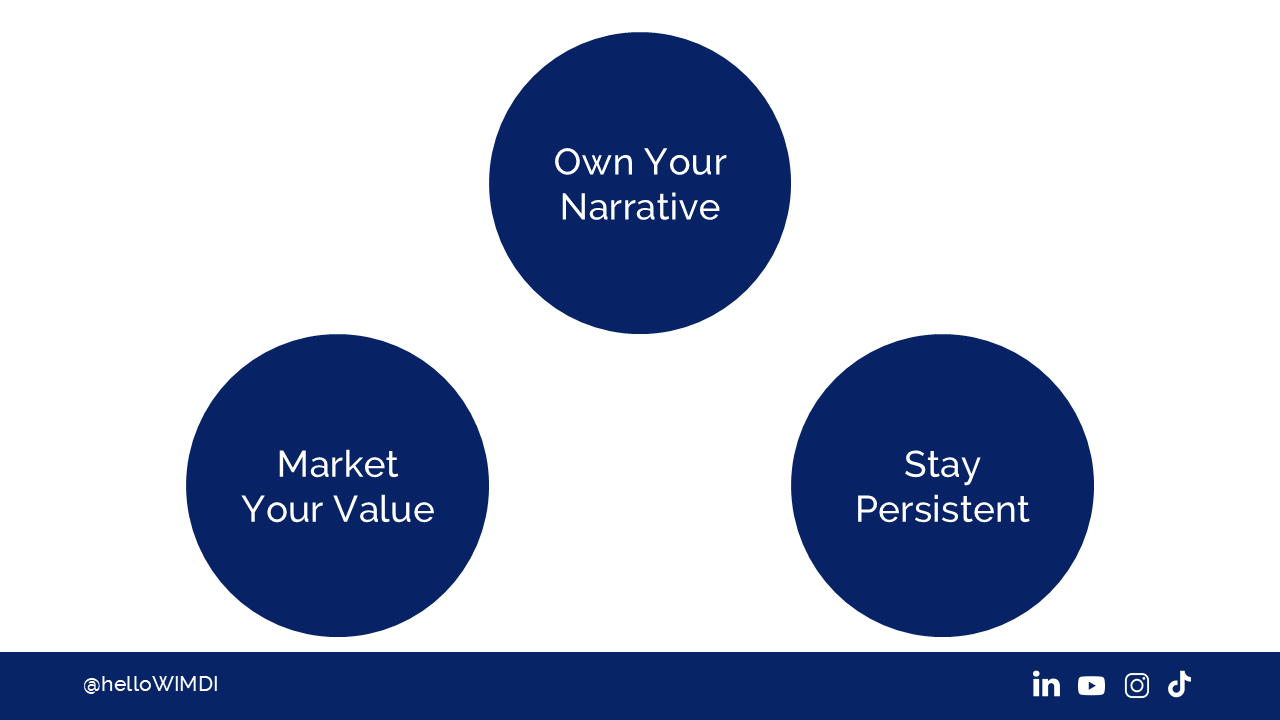
The Statistics Around Career Breaks for Women
Now, I hinted at this before, and I wanted to make sure I had some statistics to back it up, because I really want you to know that you're not alone.
Whether you're in that break right now or you're thinking about a break, and you're concerned as to how this can impact you, more than 60% of women have taken career breaks at some point in their career journey.
And here's what's interesting. Many of the points that you've mentioned before, someone mentioned to take care of a parent and to take care of children. Some people just needed a mental health break, some went on personal sabbatical, some of you mentioned medical reasons.
Those are all of the common reasons that this 64% cited for taking a career break. There are times when the career break is decided for you. If you have a layoff, well, you didn't voluntarily do that, but in any effect, it still creates a break in your career.
Here, what's interesting, upon reflection after coming beyond that hurdle, when it was time to come back to work, just about the same amount said, “You know what? I'm glad I took a break.”
For those that were in situations where they could voluntarily take a break, they were actually glad. They recognised that coming back into that space, the time away, that it allowed them to be stronger, it allowed them to have better perspective, and it allowed them to come back a lot more powerful from that space they walked away from.
Why Mindset Matters (with Case Study!)
I know you might be sitting in this space right now and thinking, "Well, I know it was the right thing to do, but now I'm nervous about, you know, how I would even get back to work that I'm not necessarily feeling very powerful right now."
That's a real aspect of it, and we'll talk about really the mindset and how we work around that. But I want you to know, and I'm sharing these statistics because I really want you to understand that you're not alone, and there's going to be a time that you're going to look back and be glad that you took the break or be glad that the break happened.
Returning is as much about moving forward and not looking back, and I mentioned that before. Just wanted to reiterate that.
Mindset matters. We can't get to that confident space that I talked about unless we address the mindset. So, we're not going to pretend like there's no fear or you have no concerns about it, but how we manage that mindset is going to be very important.
In order to do so, I'd like to share a story about a client I worked with, I'm going to call her Sharon, who had taken a break in her career for medical reasons. She had been at a job, the level of stress took a toll on her body, and she had to step away.
At the time when I was working with her, she had been out of work for about 2 1/2 years, and we were working on owning your narrative, creating that story, working on her resume, and an opportunity came up.
Why did an opportunity come up? Because at that point, there was a level of confidence, we had worked on strategy, and here comes this networking opportunity.
And here's why I'm sharing this story in line with mindset. When it came time for the networking opportunity, suddenly, all those little, I call them the gremlins, the negative voices, the fear started to come back, and she was just about terrified.
"I'm going to be at a networking event. Well, what's going to happen when someone wants to know what my title is or where do I work? You know, how is it going to be? Everyone around me is going to be talking about their job, and I'm on this career break. What am I going to talk about?"
So, I provided her with some strategies. We came up with some scripts as to how to respond to the, you know, "Where do you work?" or "Tell me about your job" questions, if it came up at the networking event so that she felt better prepared and equipped.
Here's what was interesting. She had created a whole scenario in her mind that never happened. Number one, she did follow through on going to the networking event, so kudos to her for that because that can be a hard thing.
She had a great time, made some great contacts. And she contacted me right after, and guess what happened? No one ever asked about her career. No one got into details and quizzed her about where she's working or why.
So often, we can create a scenario in our head that is far from reality, so mindset matters. And honestly, that one experience positioned her to be in a better place for success that came later on, so that when she was in an interviewing situation and someone asked, she was able to ride with it.
She transitioned back into her career in about a three-month period. Here's what I want you to take from that story that I shared.
Homework #1: Self Assessment
Part of the reason that in terms of mindset and being confident is really being able to do an honest self-assessment. And when you've been away from your industry, your field, your company, however you want to look at it, sometimes, we don't have an accurate assessment as to what it is that we're bringing to the table.
So part of the homework in managing mindset and confidence and understanding your value is that you can research five to 10 job descriptions related to the ideal position that you want to target.
And what I mean by that is that I want you to go on LinkedIn or Glassdoor or Indeed or any one of these major sites. Now, this is all research but find positions that you would actually want to apply for, and I want you to find several of them because what you're looking for is common themes across the board.
What are they asking for in terms of skills, qualifications, experience, expertise? Create a two-column table, whether you handwrite it or whether you do it in a Word document.
On the left side, what are they asking for, and on the right column, what I bring to the table, so you have an honest assessment as to where you are.
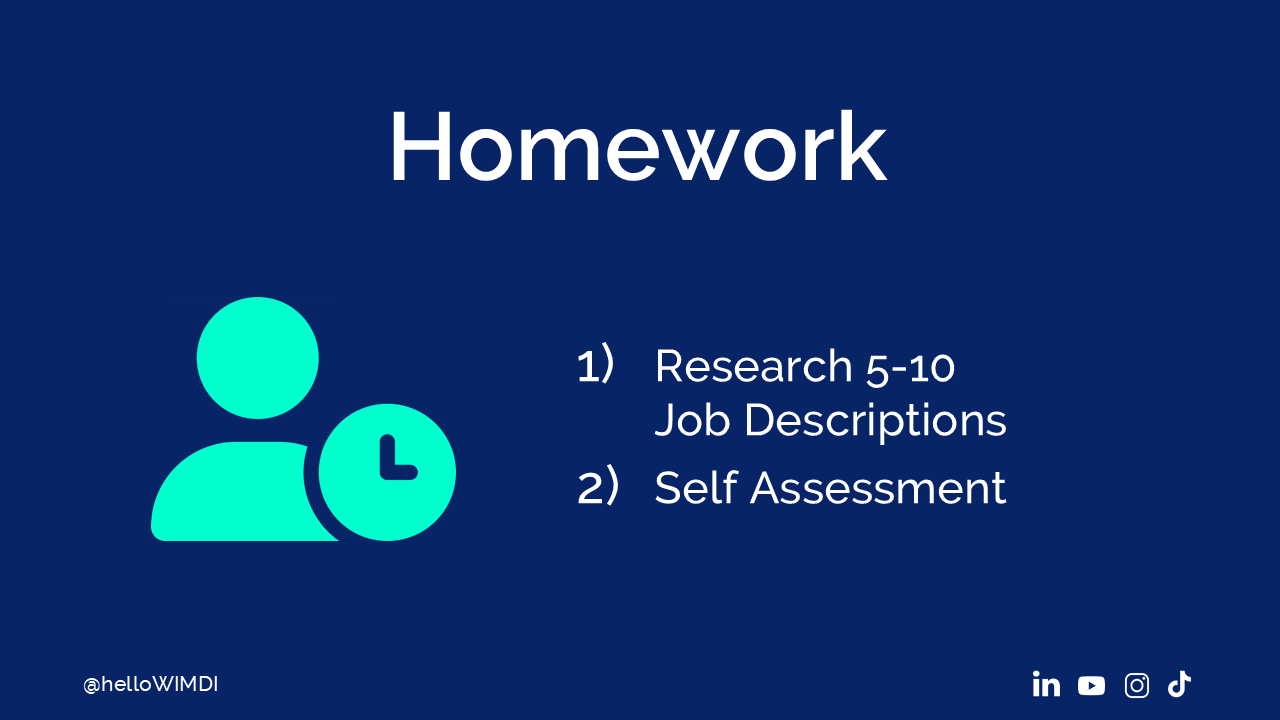
It helps you to understand am I really so far behind? Do I really have this many gaps? You may not. You might be thinking you do, and that's where it goes back to the mindset.
There's another client I worked with; she told me at this stage in the process of doing her homework, that it got to the point that she would just go back to those notes every time she felt a little discouraged because her confidence would be boosted. Why? Because she had an honest assessment as to the value that she brought to the table.
The Framework for Interviewing
At some point, we're going to get interviews. You're going to get your resume done because even the homework that I talked about is going to help you in crafting your resume, knowing what to highlight and what to emphasise as it relates to the target position.
So, you're going to start getting interviews. I want you to take a sigh of relief, or I want you to just, if right away, you've tensed up to be like, okay, I could probably navigate some networking experiences, or I could probably talk it through, but in the interview, someone is going to drill me.
I'm going to end up in front of a panel with three people, and somebody's going to be a stick in the mud and going to be drilling me about why did I take a break or what was I doing in the break?
Well, let's talk about what that looks like. The framework that I want you to keep in mind when it comes to interviewing, when you're in a space of returning to work from a career break, and we'll go through them individually, is enthusiasm for learning.
Owning your story. We're never going to get away from that. I want you to always own your story, and more importantly, I want you to own your story with pride and with confidence.
And I want you to be able to navigate the interview with a lens of being future-focused. So, what does that look like when we break it down?
The Framework: Enthusiasm for Learning (with Case Study!)
Enthusiasm for learning is being able to demonstrate with specific examples proactive efforts that you took to fill any gaps if there were any gaps. "Abby, how would I really fully understand what my skill gaps are?"
You would've done your homework and have done the research. No different than if you had been employed all the way along, you'd still do that research.
Often, we undervalue what we do in volunteer opportunities. I remember working with a client, and we were able to just about create a whole resume, and it was all volunteer work because there was leadership stuff, there was creativity, there was making an impact. Don't underestimate that.
Remember, there's formal and there's informal learning. Just because you don't have a course in or a certificate in AI prompt engineering, it doesn’t mean that you haven't learned it or you haven't taken the effort to learn it, so be ready to discuss that and to give specific examples of that.
Through networking, networking, you build relationships, you get insights, you get someone who is either an insider in the industry or insider in the company that you're going after. All of those provide material for you to create what I call your mini career success stories that you can share willingly in an interview.
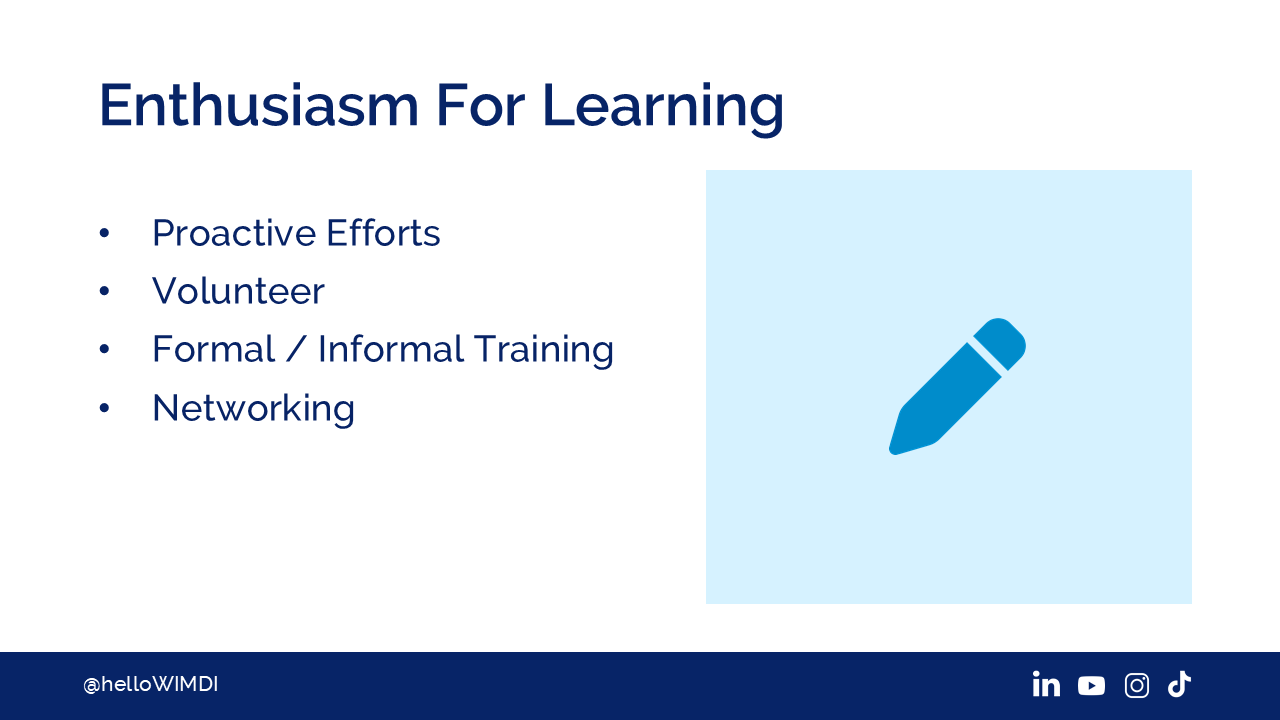
That leads us to Randi's story, one of my favourites, even though I love them all. When Randi came to work with me, Randi was an attorney. She had been an attorney probably about 10 years in her career before she took a break to raise her children.
When she came to me to start working on a job search, she had been out of her career for 15 years. You heard me right, 15 years. So, 15 years, she had stepped away from her career.
Now, in terms of enthusiasm for learning, here's what she had done before she came to me for assistance as a career coach and assistance with her marketing material, was she had spent the two years prior to that using just about every one of those examples, to decrease her skill gaps and to bring herself back up to speed with industry.
She had done a class and gained a certificate in arbitration. She had signed up to volunteer for different child advocacy cases, and negotiation cases through her local courthouse.
She was volunteering with another organisation, and she just kept abreast of different things going on as an attorney in her local county by the time she got to me.
Here's how I want you to understand the power of what you can do in a break that can propel you forward. When it was time for us to work on her resume, it was a two-page resume, the entire first page, I was able to just develop and pull-out things that she had done in the past two years, even though she had been out of her industry for 15 years.
I'm happy to say that it probably took her about three to four months to land an opportunity. Yes, three to four months after 15 years.
Today, she serves as a judicial officer in North Carolina. Huge, huge accomplishment, right? She couldn't go back and erase 15 years, but she made the most and put in the hard work to bring herself up to speed in a two-year period.
How Enthusiasm for Learning Could Be Articulated in an Interview
Here's what it can look like in an interview and this is again how mindset can make a difference.
Now, she did own her story, and I know I'm getting a little off track here, so she was bold at owning her story, so she probably addressed any concerns people had right up front.
But here's a way that you can say it. "I've already taken proactive steps to stay up to date or to stay abreast."
Walk people through what you have done, how you've been active to stay in any industry changes. You can revise this and put it in your words to make it your language.
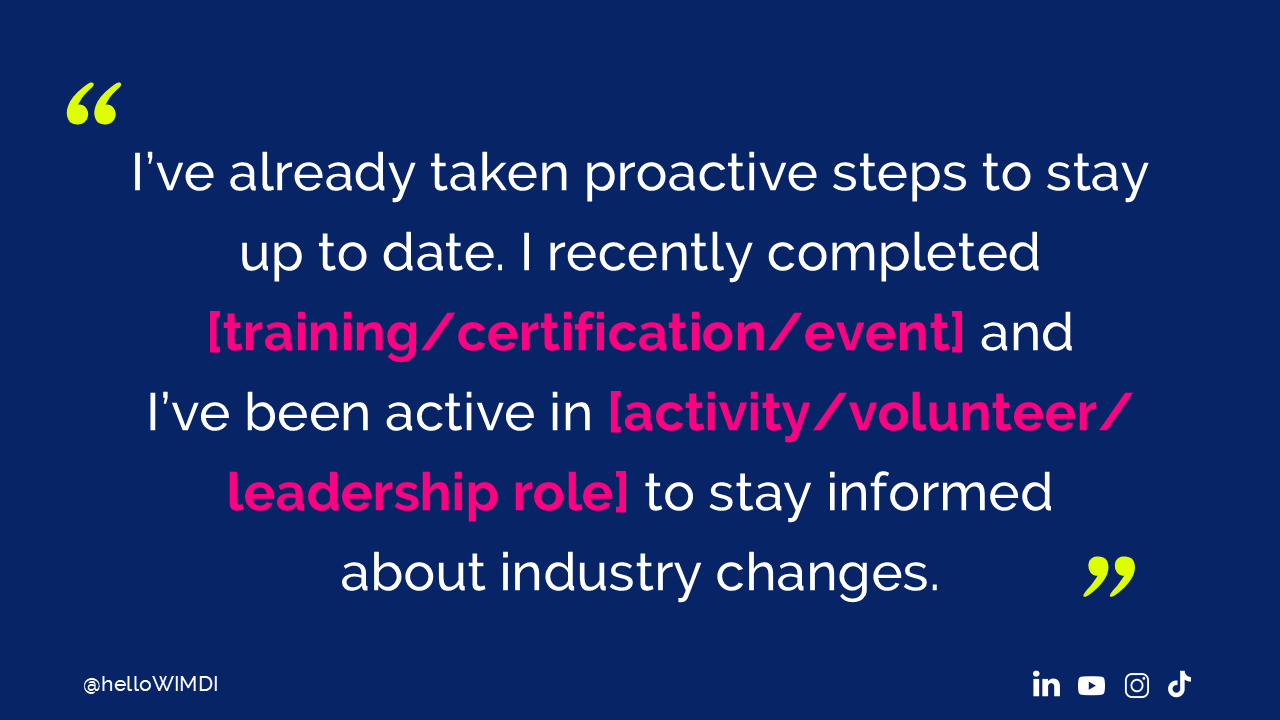
But this is what I mean with enthusiasm for learning. Show people that you've been proactive and show them that you have the ability to learn and to come up to speed with things quickly. That can erase some of their concerns about the fact that you haven't been a part of your industry in a long time.
That's one of my favourite stories. 15 years, that's powerful. So how was she able to do that?
Homework #2: Prioritise Gaps & Make a Learning Plan
Once you've done that original homework and done a self-assessment, you're going to be able to identify, "Gee, I really need to, you know, get a refresher course in, I don't know, AI." But you're going to come up maybe with a few things. There may be five things on the list. There may be two things on the list.
But you want to prioritise what are the most important skill gaps, knowledge gaps, expertise gaps that I need to close and then make a learning plan. How am I going to go about learning it?
If you have the resources, it might mean signing up for a degree. It might mean taking a course, signing up for some classes. Does it mean an online class? Does it mean webinars that you take?
Make a learning plan as to what are the skills, knowledge, and expertise that you need to learn, and explore all manners of learning. At the end of the day, I don't know about you, all I care about is that someone has the expertise. I'm not as hung up as to where they got the expertise, unless it's something that has to be very formal, like a doctor.
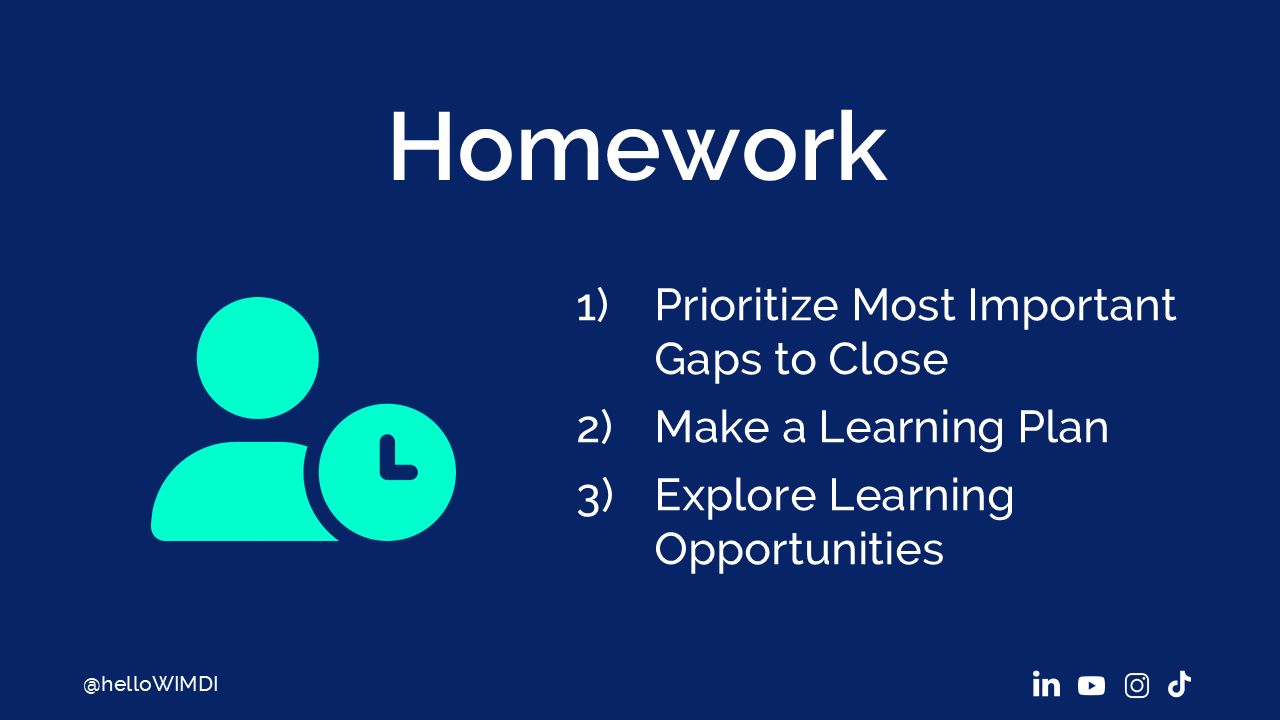
All right, so those are some ways that you address your skill gaps and address it in an interview.
The Framework: Own Your Story (with Case Study!)
Own your story. Build a strong narrative is what I mean. You want to be able to have a strong opener. So, when someone says tell me about yourself in an interview, you want to be able to come back strong.
Whether we like it or not, part of that narrative, a powerful way to start off is to start off with what I call your work identity or, really, professional identity. You might say "I'm a marketing manager", or "I'm an attorney by profession."
Start off really strong. Make that connection back to your career and back to what you've done. Address the career break.
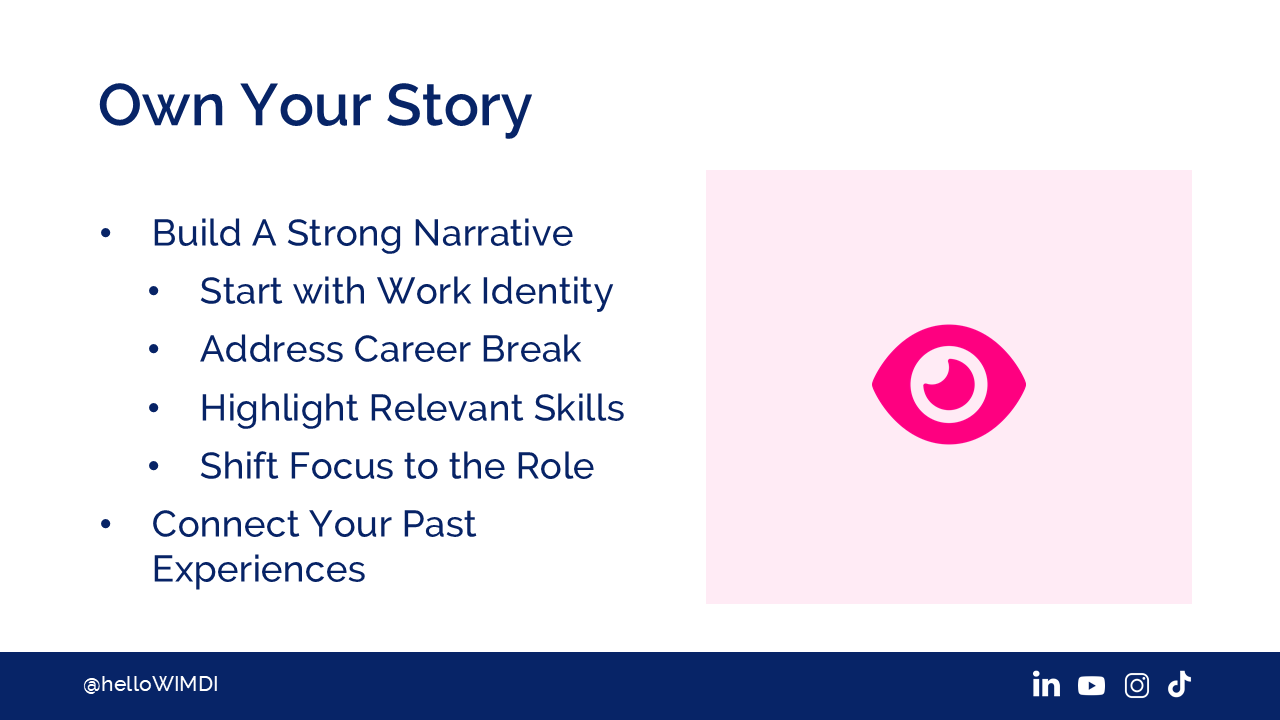
In Randi's story, right up front, she was talking to a judge, and because that's part of her profession, and she said, "I have been out of work for 15 years. I focused on raising my family," and then she went right into the skills that she was bringing to the table, shifted back to the role she was interviewing, why she was qualified for the role and was able to connect anything that she had done in her past, even if it was 15 years ago, that showed she had relevant experience, she was familiar with the topic, and she was passionate about the work. That's what I mean about owning your story.
Too often, I hear situations or women come to me, and we're working out their strategies as to go out and interview and to network, and they spent a lot of time ruminating over why they took the break and, "Well, how do I explain it? And what if someone says?"
When you are bold, and you own it right up front, it's not much for anyone to say. You've addressed the elephant in the room, but the impression that you're leaving them with are the last two points, which are the relevant skills, shifting back to the focus, what you bring to the table, and why they should hire you.
Jackie was another client I worked with, and Jackie was in the category of involuntary career break. She had been laid off. By profession, she had been in the banking industry for over 15 years, and it was not her first career break.
That made her story layered. By the time she came to work with me, her career break had been over a year. She was laid off, and then she thought, "You know what? I'm taking my hands off of anything, and I need to really just spend some time and take a personal sabbatical."
So then, it was time to start really job searching, and at that point, she decided she didn't want to go back to the banking industry. Now we have the scenario of dealing with a career break, and we're trying to shift into something completely new.
The same strategies work. We did the assessment. We worked on her resume. More importantly, we really linked what she had done in the past to what she was bringing to that organisation, prepping her to really address that career gap and have a strong opening narrative in the interviews.
She successfully transitioned from being over 15 years in the banking industry to the nonprofit industry. She transitioned to a financial literacy organisation that was nationwide.
Here's another important and curious fact. No one asked about the career break. What they were most excited about was the fact that they were going to have this professional with all this expertise and, more importantly, all these contacts that they needed in the banking industry to expand their programme.
Many times, we're creating scenarios, or we're telling ourselves it's not going to happen. In this case, she was well-prepared, did address the career break, but nobody got into the details of why and how. I don't even think anybody even asked her why she was looking to change.
They were so excited about what she brought to the table, and that was because we worked on having a story that was powerful and having a story that she was able to own.
How Owning Your Story Could Be Articulated in an Interview
Here's an example of some script that you can use.
"I successfully led...", give examples. "I quickly learned... I'm confident in my ability to adapt and learn quickly will allow me to..."
You're making that connection to your past experiences.
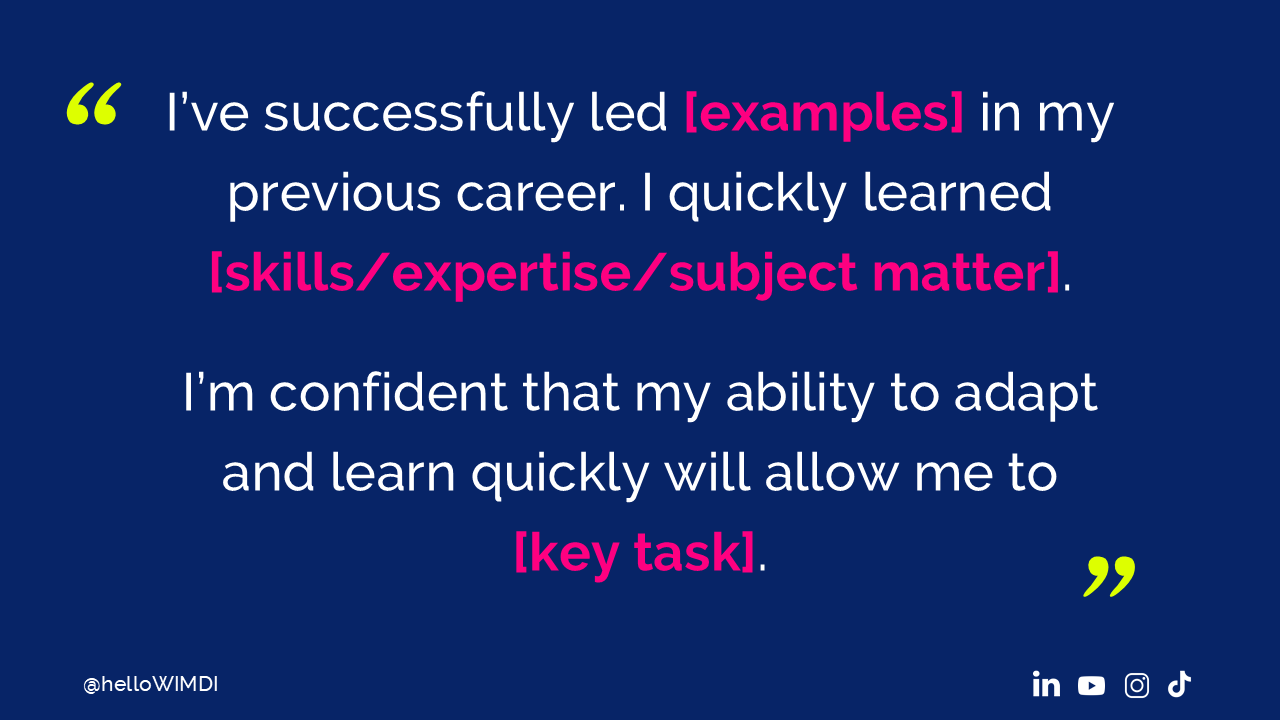
From the beginning of this presentation, I talked about moving forward. I talked about your career being a reflection of your future and not just about looking back.
We always want to address what we've done in the past. I'm a huge proponent of always having what I call career success stories or accomplishments that you can pull from that, give specific examples of an expertise or a skill at work and always be able to tie it to the job and bring it forward.
She was able to give so many examples of things that she had done that would relate to the job that they were more excited about than, "Oh, well, you know, how come you, you know, haven't been working for a year?"
Hopefully, these examples are encouraging to you. This is why I'm sharing these examples because, in every one of those scenarios that I talk about, the women that I worked with, I'm not going to pretend that they were never concerned.
I'm not going to pretend that they didn't have moments of doubt or fear or regret or thinking, "Gosh, am I ever going to be able to make this back?" You know, that can be something that's just part of the journey.
But what was important was that they didn't stay there, right? So, hopefully, you're being encouraged by that.
Homework #3: List Past Accomplishments & Relevant Career Wins
If you're in a situation now, not only did I take a career break, now I'm trying to move into something completely new, part of the homework, when you've done your self-assessment and unpacked what you bring to the table, you're always going to want to pull out accomplishments. Accomplishments sell.
They may not remember whether you were wearing glasses or not. They may not remember the colour of your shirt when they interviewed you but tell them an impactful accomplishment. Allow them to see how a similar accomplishment can make a contribution to their organisation, and they're going to remember that.
So, you want to be able to pull out your past accomplishments, but you want to line up those accomplishments that more relate to the job that you're going into, and relate to the industry that you're trying to transition to.
Find the relevance, make the connection, and share those in an interview. All very effective at creating a strong narrative.
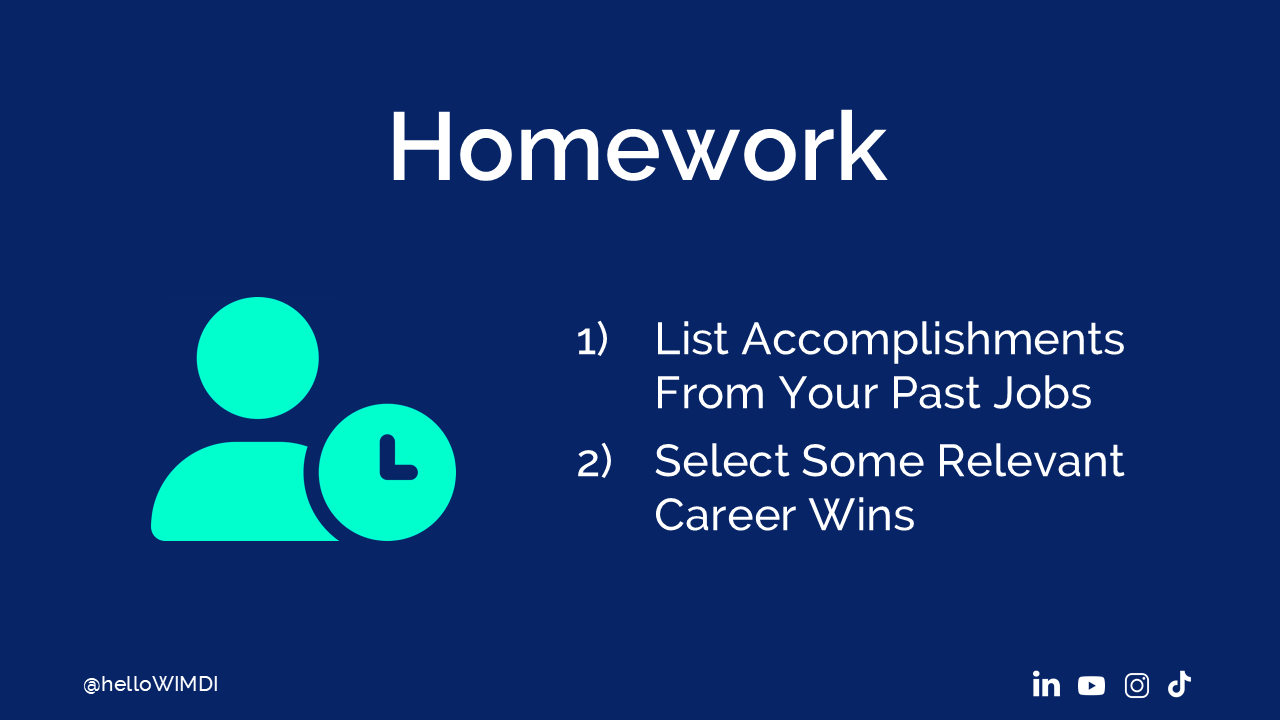
The Framework: Being Future Focused (with Case Study!)
The last piece of that three-part strategy is about being future-focused. I remember many, many years ago working with a professional woman that had done some great things in her career, but she had accepted a position that really didn't work out, and as a result, it created a gap.
I will tell you that one of the hardest things about trying to work with her, is that she had so much trouble forgiving herself for that career gap, and that's why I really emphasise that we own our story, we address the break, and we just keep it going.
She couldn't forgive herself, so keeping the conversation positive and keeping it future-focused was so hard for her because she kept going back to "I knew I shouldn't have done it, and I knew."
And that keeps you stuck, and that doesn't allow you to move forward. So, I want you to always remember, we're moving forward. We're moving forward with purpose. That our career break doesn't define us. Our story and our potential does.
So always, in those conversations, in those interviews, look to the future. Show them how, where you are now and what you have now, how it can propel you forward, how it can propel them forward, how you can pivot, how you can pick up something and make a difference today. We're not going to ignore the elephant in the room.
Now, if they don't ask and make a big deal, then I don't think there's a need to dwell on it, so you can acknowledge it, but don't dwell on it. Always highlight your skills.
Make sure that you're tying in the things that are relevant. That's all going to be part of your preparation process.
Even in your career break, whether it meant you had still kept up with conferences, you still were part of a local chapter of an association, whether you got trade publications or newsletters that you continued to receive, share your thought leadership, share your perspective.
Because you took a break in your career, your entire brain did not shut off. It just meant that you stepped away from your career. You still have value, and you still have perspective.
In the case of Jackie, she had an incredible network. While she had had a break and she was looking to pivot into something else, that was important to where she was going. So please, do not undervalue yourself.
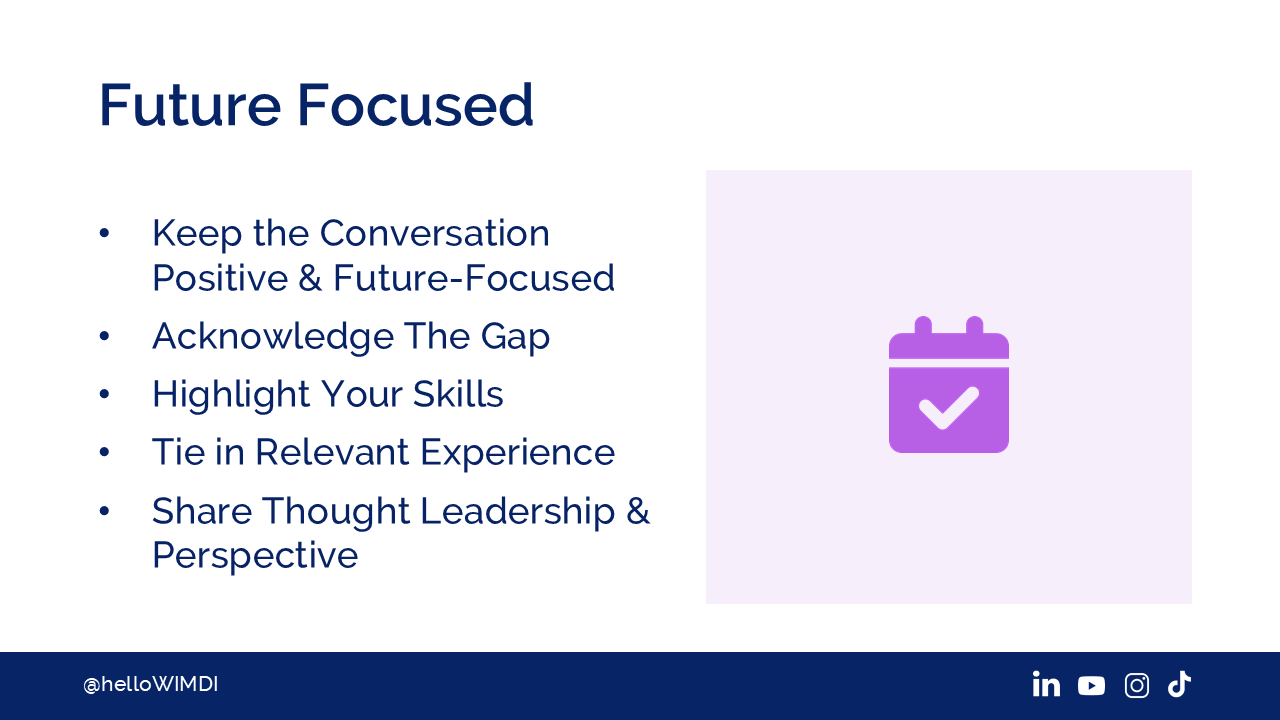
In terms of future focus, let's talk about Denise's story. Denise had taken a career break after her mother had passed. She had been her mother's caregiver while she was working full-time.
Her Mum passed, and she took about two years off, then it was time to get back to her career. Now, when she came to me to work on her marketing strategy, self-marketing strategy, her resume, and to get ready for interviews, she had not done a resume since she was out of college.
At this point, she had been working in her industry for over 15 years, so it was trying to remember details and facts and to put all these things together to market herself.
Here's what she had working for her in terms of being future-focused. She was going back to the same industry, the same type of work that she had left two years ago.
She was able to easily focus on her thought leadership and her perspective as to what was going on in the industry, what she was bringing to the table, what she had done before at other human health services agencies before that she could bring to a new agency, ideas, and everything else.
Her transition back into her field, I would say, honestly, was one of the smoother ones than I ever imagined. I swear, it felt like she was looking for a job, and then she had a job. And again, that was with a two-year break.
All real stories, all true, and all examples as to how it can happen, and I really hope that you are encouraged to listen to this.
How Being Future Focused Could Be Articulated in an Interview
This is just an example. It's not the only example of a way that you can approach it.
"I've always approached challenges as opportunities to grow."
You give examples of what you were doing during that break as to what allowed you to stay abreast and to stay on top of what was going on.
It could be something simple like you never let go of your network. It meant that you were meeting with your coworkers or your past teammates on a monthly basis.
It meant that you were still participating in professional activities. Remember, I said that informal and formal training are all valuable, so whatever it is that you did that can demonstrate to an employer that, "Hey, I'm still good to go", incorporate that into your responses and into your interview stories that you share.
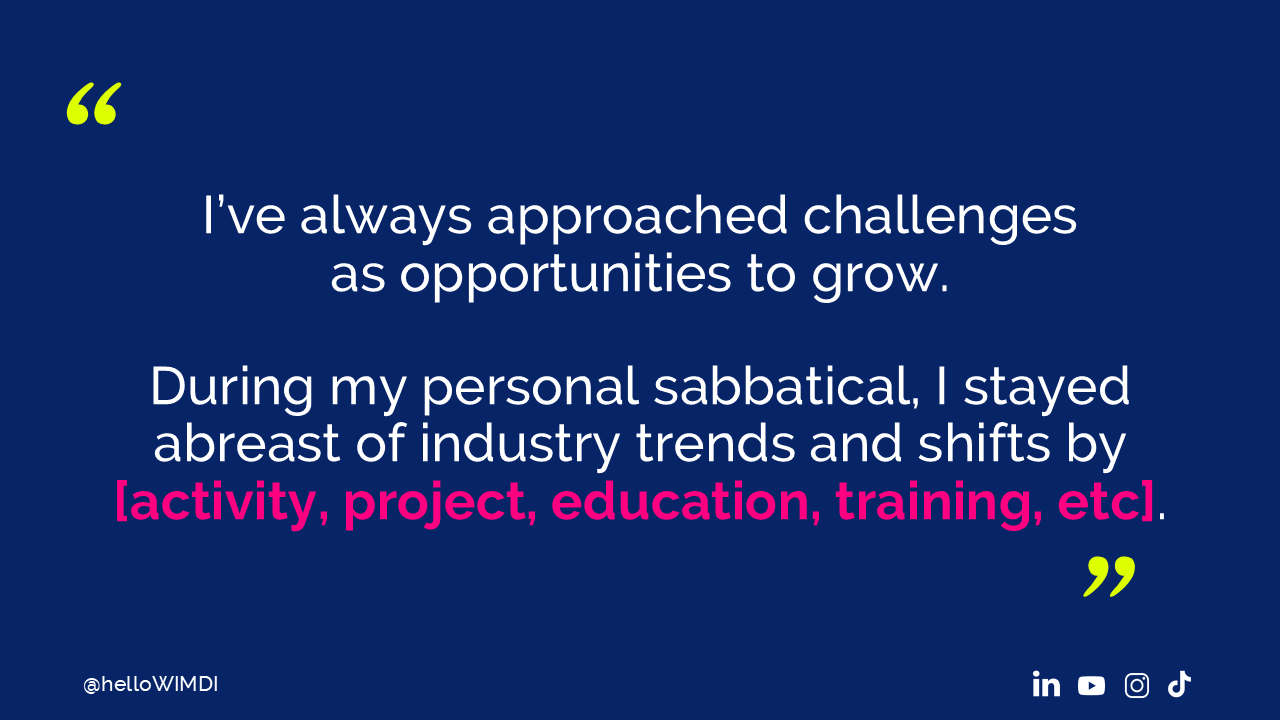
Homework #4: Identify Strengths, Career Accomplishments & Share Them!
What that means from a homework perspective, is that, at all times, you want to know what your top three to five strengths are.
You know, if you feel like your strength is in team leadership, don't just say, "Oh, I think I'm an amazing team leader", or, you know, "I'm a strong team leader. I'm really great at motivating teams."
Make sure that you have a specific example to share. Remember, I said people remember those stories. Point to an example, and those are stories then that you can share whether it's interviewing, networking, or informal conversations.
Because they're your stories, the more you share them, the more you talk about them, it becomes natural, it flows.
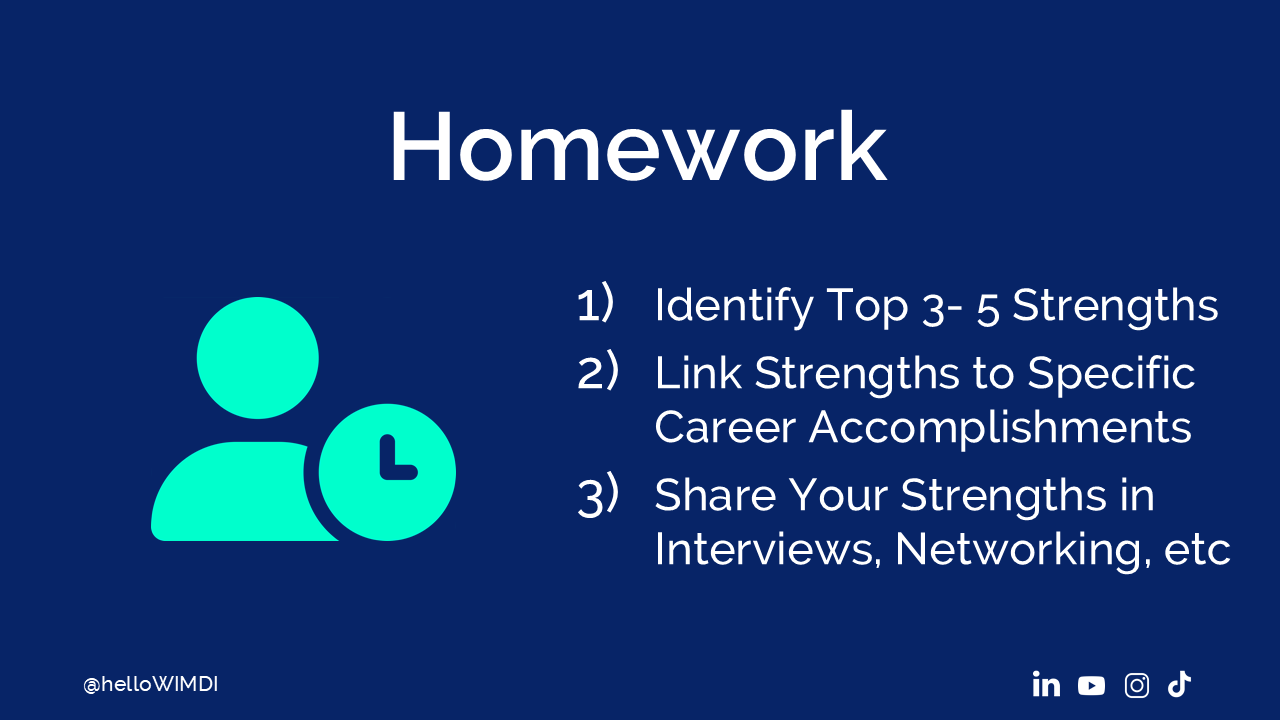
We go right back to the beginning of the presentation of confidence plus strategy equals opportunities, right? But we have to do the work. We always know that. Always future-focused.
What if it’s Still Not Happening?
We’ve got to address the elephant in the room. I kind of hinted at it before.
"Abby, I'm doing all of these things. I was excited to see some of the things that you've shared, but it's not happening for me."
It's going to take some time. Every one of those examples that I gave you had its ups and downs. Even with Denise that I said was one of the smoother transitions back to her industry than I had imagined, the hurdle was the mindset.
We had to work with the mindset to get her to take the action. Sharon, we had to work through the mindset to take the action. Jackie, we had to get through, how do you pivot and how do you talk about yourself when you're shifting to something else?
Randi, lots of hurdles. That was 15 years. The number of times that we had to have sessions and say, "Okay, how can we reframe what you're thinking?"
So, if you're feeling like it's not happening for you, understand that that emotion and that perspective is going to come up at times, but I always want you to know that when your job search becomes what you are feeling might be stagnant, that there are some things to consider.
Set Realistic Expectations
The number one thing you want to be able to do is to set realistic expectations. And realistic I almost want to put in quotes. Because what might take, Holly 90 days might take me six months.
That's not necessarily a reflection of my skills or expertise versus anyone else's. It's simply there are going to be other factors that are out of your control that you want to make sure that you are controlling what you can control but have realistic expectations.
I've taken a break. I've stepped away. I'm doing something new. I'm doing something major. This is a major project that, when I get beyond this, I can look back and go, wow, that was a major accomplishment. Allow yourself some grace in going through the process.
The average time for a successful job search is three to six months. Take into consideration what might be going on in your industry, what might be going on in the economy, political factors, economic factors, whole lot of other factors.
The things that you can't change, you can't change, but you still do your part but just know it's going to take some time. And the three to six months is a good gauge, it's not even necessarily a magic number.
Depending on what's going on in your region, are you looking for a local job, national job? Are you willing to try another country, move to another region? All of those things are going to impact how long it takes. So keep that in mind.
How to Stay Motivated
What do you do in the meantime to stay motivated and to stay encouraged? I don't want you to go out there and start off really hard, not see success, and then get really discouraged.
I already mentioned the first thing. Focus on what you can control. Set daily goals, set small goals. Your success is happening throughout the entire process, but if you're not stopping to pay attention and to give yourself grace and give yourself kudos as you go through the process, you're going to miss it.
Have a routine. When you have a routine, it'll help you to recognise, you know, is it that I'm not following the steps or things are really taking longer than I'd planned. But if you don't have a proper routine, then it'll seem like things are just topsy-turvy and stuff is coming at any direction.
We don't go it alone. In the stories that I shared today, they didn't go through it alone. They worked with me, someone who is a career coach. They also had people in their personal network to support them and to encourage them and hold that space for them to encourage them to move forward.
What happens in a time when, "Abby, it's been three weeks, and no one has contacted me for an interview?"
Well, what could you be doing at that time? What are you learning in the process? Are there patterns that you're noticing? Are you noticing that, okay, if I apply to an engineering company, they seem to be faster in their responses than in a technology company?
Pay attention to what is going on and don't always assume that the problem is you.
Celebrate those wins and remember to reward yourself. If you go on an interview and you nailed that "Tell me about yourself" question, saying, "Man, I came back really strong. I had a strong narrative. Nobody even asked me about that career break, while in interviews before, it would always somehow come up."
Then that's a win. Go ahead and celebrate it and reward yourself.
Move Forward with Purpose
Three things you're going to keep pushing on, when you feel like it's stagnant, when you feel like it's not going anywhere.
The first thing is to assess, and we talked a little about that, so I'm not going to dwell on this for too long.
The first thing that you want to do is to assess. Is it the type of companies? Is it the type of jobs? Are people, you know, misunderstanding what's on my resume? Do a quick assessment to see is there really a bottleneck or an issue that's happening on your end.
If so, adjust. Are people calling me, but I'm getting called for the wrong jobs? I remember someone being called for all these sales jobs.
Well, the entire resume screamed how amazing she was at sales. If we're trying to move away from that, then we have to shift it.
In Jackie's example, everything was about banking, personal relationships and getting loans for small businesses. We had to pivot a lot of that language so that someone who was in a financial literacy organisation could see the value.
So, make the adjustment.
And if you say, "Well, Abby, I've assessed it. I've made some adjustments. I feel like I'm still not moving along," then that's where that persist has to happen.
It's rinse and repeat, rinse and repeat. Control what you can control and just stay the course.
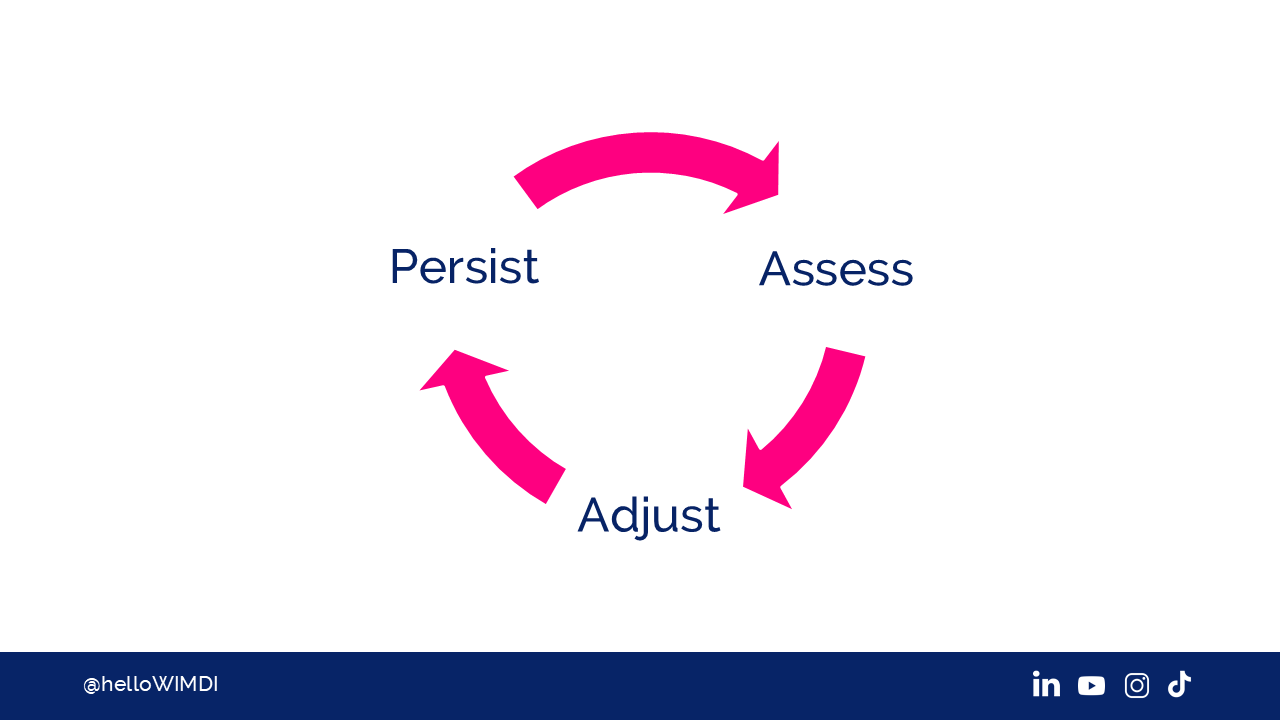
Overall, moving forward with purpose requires you to do a number of things. First and foremost, it's to remember that a career break doesn't define you. Do not box yourself in.
Even if in interviewing, even people who are well-meaning in your circle, even in networking, even if somebody else tries to define you, you don't have to box yourself in by a career break.
The second someone says, "Oh, but you've been out for, so," "Oh, well, you could never," then, you know, do what I do, start to tune out that conversation. That doesn't define you.
Your story and your potential do, and that's what we lean in on.
Own your narrative. Be proud of that story. Market your value.
I showed you in the diagram in the slide before, that persistence, because that's what it's going to take.
You can't be persistent until we've really nailed up here in terms of mindset. Are you going to have tough days and tough moments? Absolutely, you reset, and you push through.
Having that confidence and strategy are going to lead to opportunities. Every one of those examples that I shared had their moments of doubt. We reflect on potential, not on the past.
Next Steps – Abby's To-Do Lists
All right, so what does it look like in terms of next steps for you? I've outlined a lot of strategies. I've shared a lot of success stories. I've given you some homework.
So, what are good next steps for you? I'm going to call this my career break to-do list.
You want to address those gaps in learning. You want to do your research. You don't know what you don't know. You have to do the research.
You have to do some degree of self-assessment. You have to know what you're bringing to the table, and you have to know where there are gaps.
There are going to be gaps. Don't be discouraged by the gaps. Prioritise, put them in order, which is most important for me to close.
Have a learning plan and explore every learning opportunity. A blog, a book, a podcast, a webinar, a YouTube video, any way that brings learning to you, know that you're on track with your learning plan.
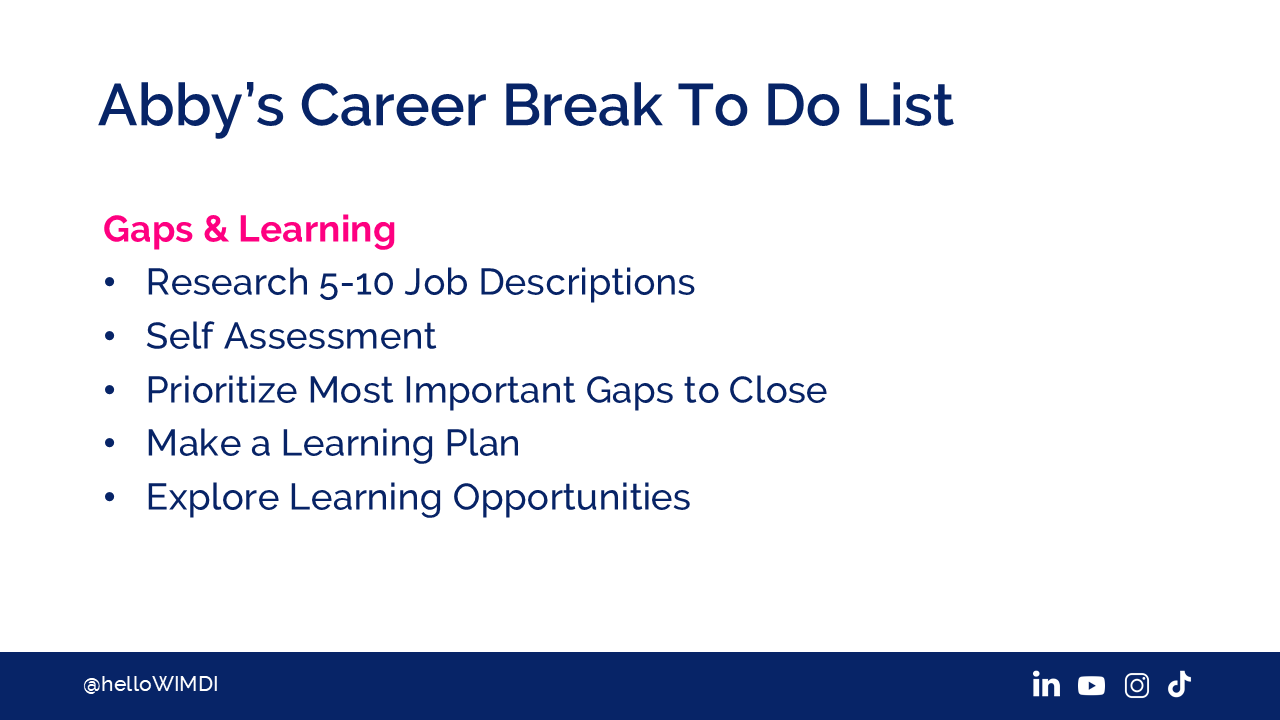
Strengths and accomplishments. I love recommending to clients that in interviews, when they ask you a story, ask you a question, whether they ask you the question in a behavioural style, like, "Tell me about a time when...", or "Give me an example of...", that's great when they ask those questions.
There are times when maybe the interviewer is not as skilled, so they don't ask that question. They just say, "Well, are you comfortable doing, you know, cold calls?"
Don't just say yes or no in any of your responses. You say yes, and then you tie it to an example. You can't have those examples handy and ready to go unless you've done that work.
Pull out those accomplishments, find what's relevant for the job that you're interviewing for, know what your strengths are, and be able to weave them together so that you truly are sharing a story that keeps the interviewer engaged, interested, and, more importantly, impressed with what you're sharing.
You're bringing value. You're inviting them along on the journey to hear about it.
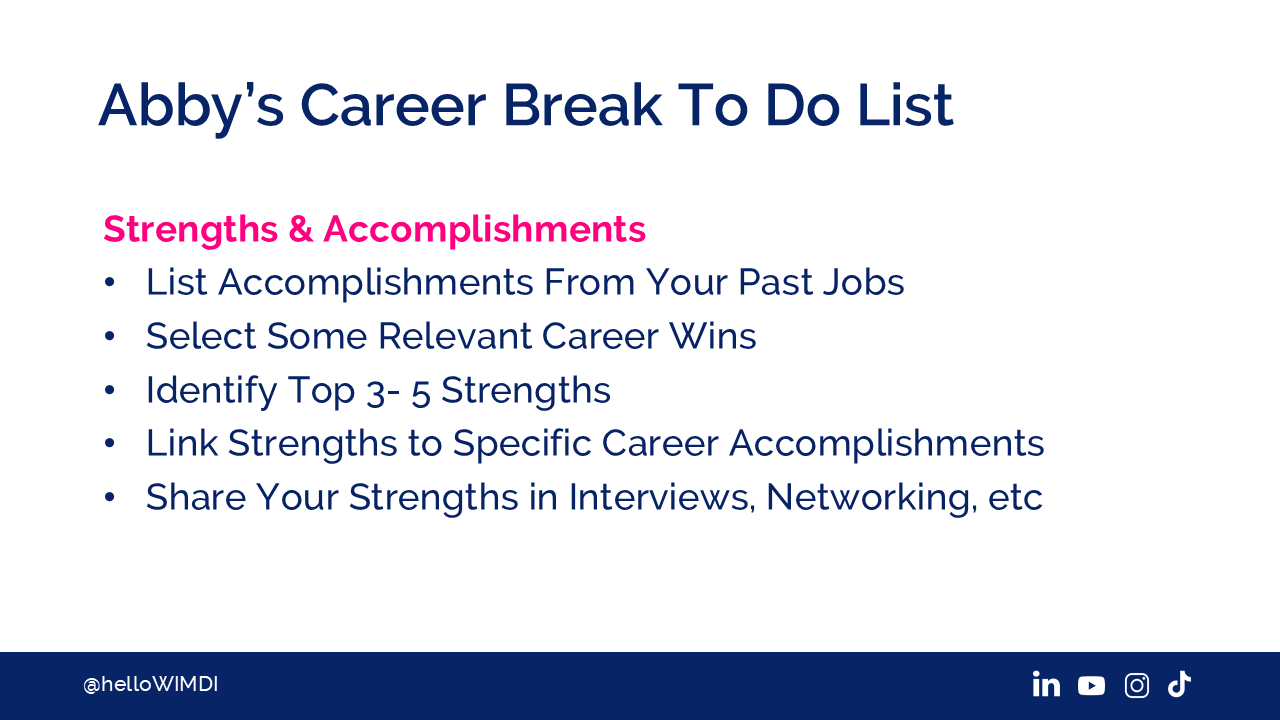
All right, so in today's presentation, I really hope that you found value in what I shared in terms of how you return to work after a career break.
I really outlined some strategies for managing your mindset, a framework for interviews, and really homework steps all along, and what are some good next steps.
I really hope that you were encouraged and motivated with the variety of success stories that I shared with you of other women who had been in the same situation.
And I want to close with this one point, that you're not alone. Remember, you are among one of the over 60% of women who have taken or will take a career break, but also, there's going to be a point where you'll look back, and you'll be glad that you took a career break because you'll be better off for it.
If you'd love to stay in touch, my LinkedIn profile is here. You can reach out to me at abbylocke.com
I'd love an opportunity to hear from you as to how you found today's presentation. And certainly, if you wanted an opportunity for us to work together, that would also be my privilege.
More Fun Stuff!
If you loved reading this transcript, you might like to watch the video or learn more about our amazing speaker! Check it out: